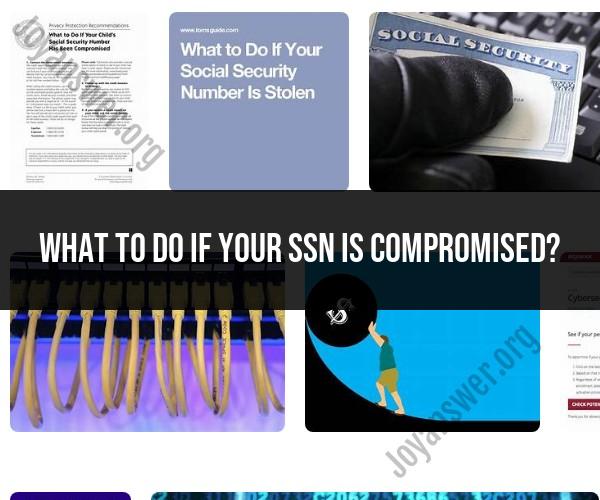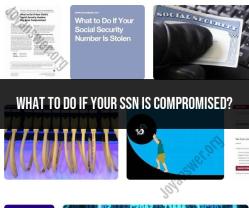What to do if your SSN is compromised?
If you suspect that your Social Security Number (SSN) has been compromised or you've become a victim of identity theft, it's essential to take immediate steps to protect yourself. Here's what to do if your SSN is compromised:
Contact the Authorities:
- Report the identity theft or SSN compromise to your local police department or the law enforcement agency that handles identity theft cases. Obtain a copy of the police report, which may be required for various identity theft resolution processes.
Notify Credit Bureaus:
- Contact all three major credit bureaus—Equifax, Experian, and TransUnion—and request a fraud alert or credit freeze on your credit reports. This prevents fraudsters from opening new accounts in your name.
Monitor Your Credit Reports:
- Request free copies of your credit reports from each of the credit bureaus. Review them for any unauthorized accounts or suspicious activity. You're entitled to one free report from each bureau annually at AnnualCreditReport.com.
Report to the FTC:
- File a complaint with the Federal Trade Commission (FTC) through their website or by calling 1-877-ID-THEFT (1-877-438-4338). The FTC can provide guidance and resources for dealing with identity theft.
Notify Your Financial Institutions:
- Contact your banks, credit card companies, and other financial institutions to inform them of the compromise. They can help you secure your accounts and investigate unauthorized transactions.
Change Passwords and PINs:
- Change the passwords and personal identification numbers (PINs) for your online accounts, including email, banking, and social media. Ensure that your new passwords are strong and unique.
Contact the Social Security Administration (SSA):
- Visit the official SSA website (ssa.gov) or call 1-800-772-1213 to report the SSN compromise and obtain a new Social Security card. The SSA can provide guidance on next steps.
File an Identity Theft Report:
- To establish your identity as a victim of identity theft, you can file an Identity Theft Report with the FTC. This report can be useful when dealing with creditors.
Notify the Post Office:
- If you suspect mail theft or redirection of your mail, contact your local post office and report the issue.
Consider Credit Monitoring Services:
- Enroll in a credit monitoring service that can alert you to changes in your credit reports. Some of these services are offered for free or for a fee.
Be Cautious with Personal Information:
- Going forward, be cautious about sharing your personal information. Be especially vigilant when providing your SSN, and ask why it's necessary when requested by businesses or organizations.
Keep Records:
- Maintain a detailed record of all your interactions with authorities, financial institutions, and credit reporting agencies, including dates, names, and reference numbers.
Remember that identity theft and SSN compromise can have lasting effects, so it's crucial to act quickly and diligently to resolve the issue and protect your personal and financial information. Additionally, consider consulting with an identity theft resolution specialist or an attorney who specializes in identity theft cases for guidance on your specific situation.
Steps to Take if Your Social Security Number (SSN) is Compromised
If you suspect that your SSN has been compromised, there are a few steps you should take:
- Place a fraud alert or credit freeze on your credit reports. This will notify potential lenders that they should verify your identity before extending credit to you. You can place a fraud alert or credit freeze for free at annualcreditreport.com.
- Monitor your credit reports for any unauthorized activity. You can get a free copy of your credit report from each of the three major credit bureaus once per year at annualcreditreport.com.
- Report the identity theft to the Federal Trade Commission (FTC). You can do this online at identitytheft.gov or by calling the FTC at 1-877-IDTHEFT (1-877-438-4338).
- Report the identity theft to the Social Security Administration (SSA). You can do this online at ssa.gov or by calling the SSA at 1-800-772-1213.
Reporting Identity Theft and Unauthorized SSN Use
You can report identity theft and unauthorized SSN use to the following organizations:
- Federal Trade Commission (FTC): identitytheft.gov or 1-877-IDTHEFT (1-877-438-4338)
- Social Security Administration (SSA): ssa.gov or 1-800-772-1213
- Local police department
- Credit bureaus: Equifax, Experian, and TransUnion
Identity Theft Prevention Measures
There are a number of steps you can take to prevent identity theft, including:
- Protect your SSN. Do not give out your SSN to anyone unless you absolutely must.
- Be careful about what information you share online. Do not share your SSN or other personal information on social media or other public websites.
- Use strong passwords and create unique passwords for each of your online accounts.
- Keep your computer and mobile devices secure. Install antivirus software and keep your operating system and apps up to date.
- Shred any documents that contain your SSN before disposing of them.
Replacing or Updating Your SSN in Case of Compromise
If your SSN has been compromised, you may need to replace or update it. You can request a new SSN from the SSA if you are a victim of identity theft and can prove that you are at risk for serious harm.
To request a new SSN, you will need to complete Form SS-5 and provide documentation to support your claim of identity theft. You can find Form SS-5 on the SSA website.
Legal and Financial Consequences of SSN Compromise
If your SSN is compromised, you may be at risk for a number of legal and financial consequences. For example, identity thieves may use your SSN to open new credit accounts, apply for loans, or even commit crimes.
If you are a victim of identity theft, it is important to take steps to protect yourself from the legal and financial consequences. You should monitor your credit reports and credit score regularly. You should also report any unauthorized activity to the appropriate authorities.
In addition, you may want to consider filing a police report and contacting the three major credit bureaus to place a fraud alert or credit freeze on your credit reports.


